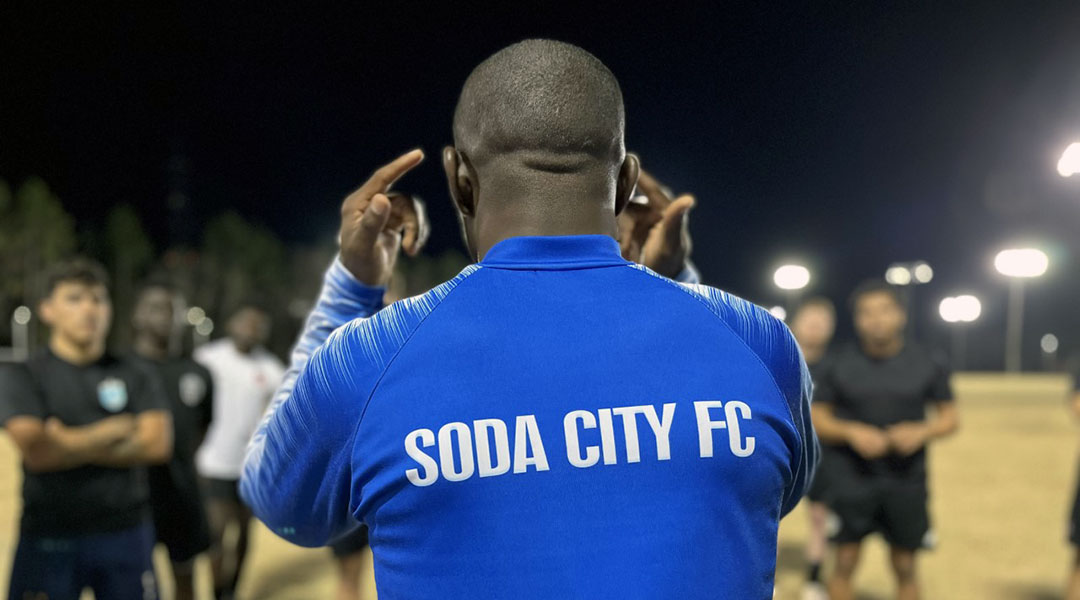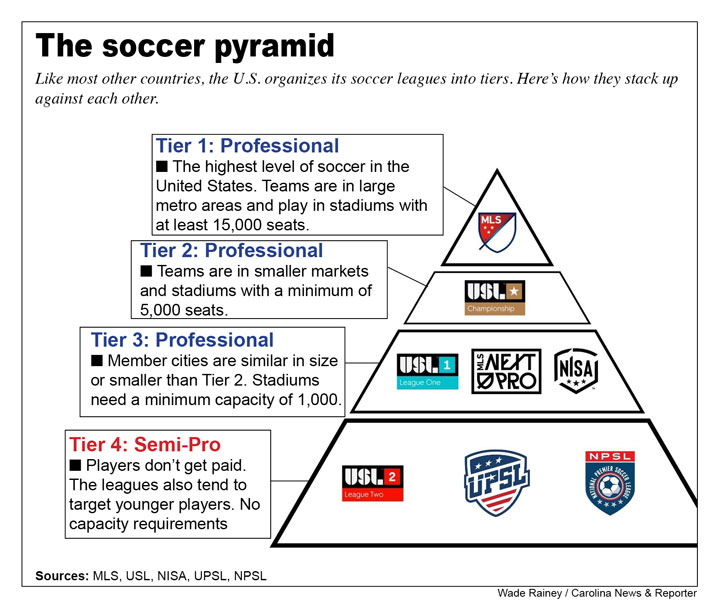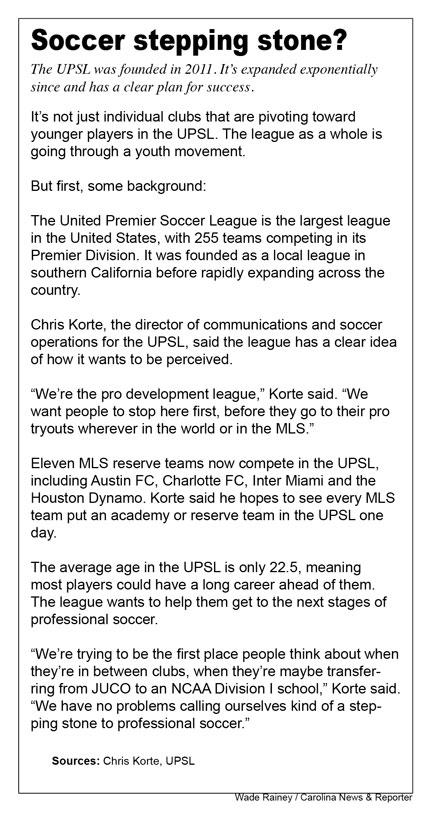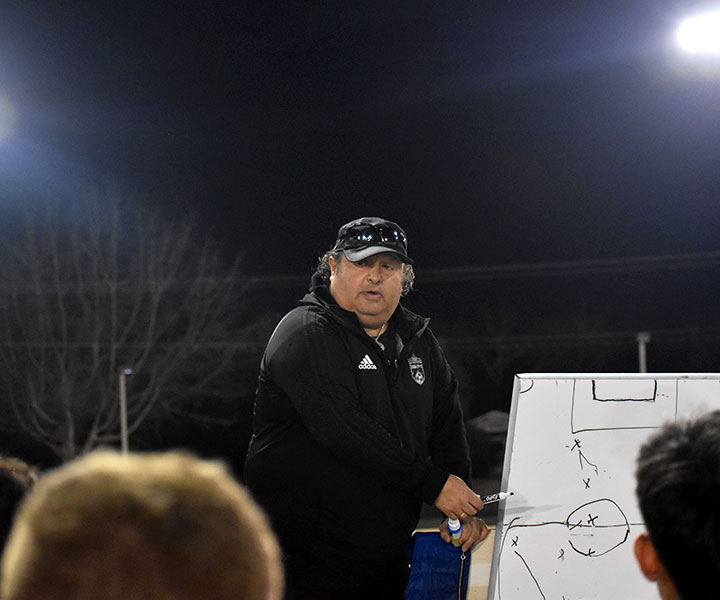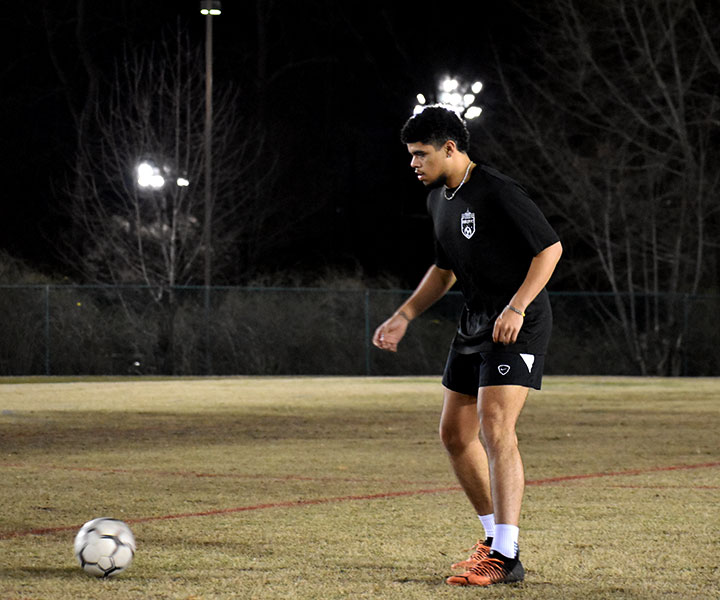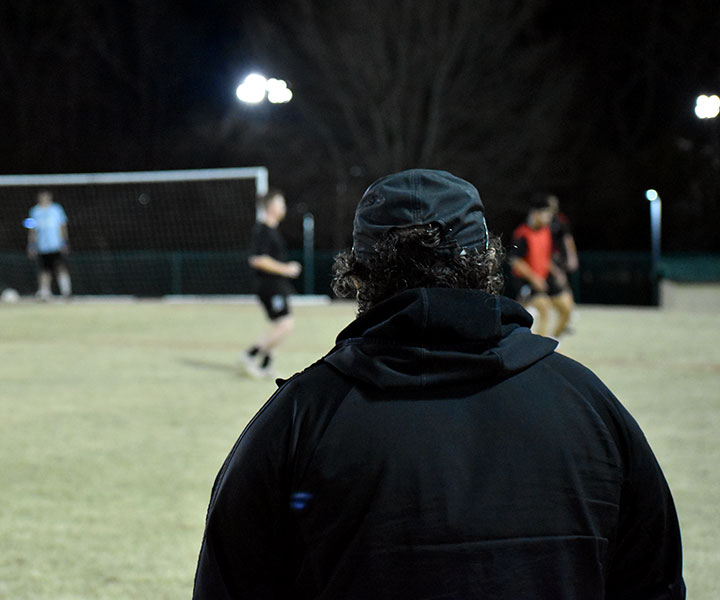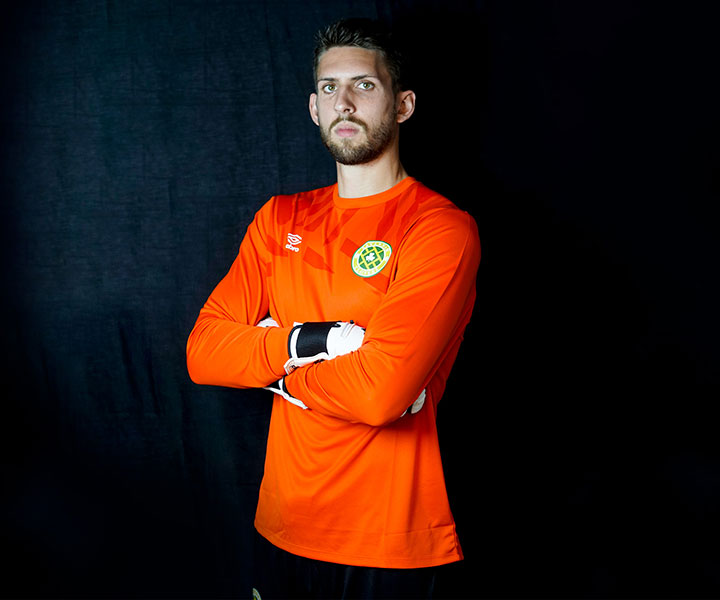Soda City FC Coach Debola Ogunseye lectures players at the end of a training session. Ogunseye played professional soccer in the Turkish second division before his coaching career. (Photo by Wade Rainey)
The clock struck 10 p.m., and the Lexington Soccer Complex was cloaked in darkness as the lights shut off for the night. Luckily, the last team on the fields had just finished up their training session and were breaking down that day’s practice.
The team was Soda City Football Club, a semi-professional soccer team based right here in Columbia.
Playing for Soda City doesn’t come with the same glory as playing for Barcelona or Manchester United, but players have signed up either because they just love the game, or they want one more shot at the next level of competition.
That love for soccer is becoming more and more commonplace in the United States. In 2018, a Gallup poll concluded that soccer is the fourth-most popular sport in America, surpassing hockey.
The number of players has steadily increased since the 1990s, and nearly a third of Americans call themselves soccer fans today, an all-time high.
Soccer clubs like Soda City FC are looking to capitalize on this increase in popularity. By combining youth development with exciting soccer, the Columbia club hopes it can grow the profile of the game here.
“To provide opportunities for players to continue their pathway of soccer, ultimately, to go pro, or to go college,” Tony Baker, president and one of the founders of Soda City FC, said of the club’s goals.
How it works
But if they’re not a professional team, where does Soda City fall in the grand landscape of American soccer? Picture a pyramid.
Nearly every soccer-playing country in the world organizes its soccer leagues into a pyramid, with the best leagues at the top.
In the United States, that means Major League Soccer, or MLS, is at the top. They are followed by the United Soccer League Championship, the USL, in the second tier.
The third tier consists of USL League One, the National Independent Soccer Association, or NISA, and MLS Next Pro.
The third level is where professional soccer stops.
Soda City FC exists in the fourth tier and plays in the United Premier Soccer League, the UPSL, a semi-professional organization.
This means players aren’t paid, and the team (mostly) isn’t selecting from the same talent pool as the top three levels.
That doesn’t mean the players aren’t capable of playing high-quality soccer. Between Columbia and South Carolina-area high schools and colleges, Soda City has a wealth of local talent from which to recruit.
One of those players is Graham Jermstad, a former Dutch Fork High School star who was the first ever to sign with Soda City.
“They were all about the local lads early on, and they still are today,” Jermstad said. “That drew me to it.”
Jermstad spent time at both Newberry College and Columbia International University during his college career.
He also played a few seasons with the S.C. United Bantams, who compete in USL League 2, another league in the fourth tier of American soccer.
Now, Jermstad coaches at Dutch Fork. He also recognizes the importance of Soda City’s continued support of young players in the area.
“I’m looking at my (Dutch Fork players) not only for high school and college offers, but later on to coming back home and playing for Soda City,” Jermstad said. “We scout out younger guys, and hope to bring them up in the future.”
While scouting local players is a big part of Soda City’s recruitment strategy, many names that are considered come from connections that Baker and the rest of the staff have built throughout their careers.
The club has relationships with Columbia International, Newberry and Tony Baker’s alma mater, Francis Marion University.
Head coach George Trifos has connections with pro coaches across the country. Players on the University of South Carolina club soccer team will also occasionally play with Soda City.
A Soda City success story
Despite all of those connections and their benefits, Soda City’s biggest success story – one they hope they will be able to replicate in the future – is a Columbia native.
Jack Pondy played high school soccer at A.C. Flora, where he starred as a goalkeeper. He parlayed that success into a scholarship at the University of Connecticut.
But he left, he said, after a semester because he was not getting enough playing time. The team had five goalkeepers to divide time among.
Pondy transferred to Winthrop University, where he played for two years. After his first year, he was introduced to Soda City FC.
“(An assistant coach) gave me a call,” Pondy said. “And said, ‘Hey, we’re starting this semi-pro team in Columbia. We’d love to have you try out.’ ”
Pondy tried out for the team in the summer of 2018 and played in a preseason scrimmage before returning to Winthrop in the fall.
After the college season ended, Pondy left Winthrop for good, joining Soda City for the end of the United Premier Soccer League season.
Pondy played with Soda City for a couple of years, was a key player on multiple playoff teams, and was a big part of the team’s best-ever finish in the UPSL. They made the national semifinals in 2020.
In 2021, professional soccer came calling.
“(Soda City) got a call from the head coach of the Charleston Battery,” Pondy said. “One of their goalkeepers got hurt in preseason, and they wanted me to come train with them.”
Playing time was scarce for Pondy in that first season, but he spent his time “learning and training,” and waiting for his next break.
After the season ended, he bounced around as a free agent from trial to trial, eventually returning to the Battery again after another starting goalkeeper got hurt.
It was during his second stint with the Battery that Pondy received a call from the Savannah Clovers.
That’s a former UPSL rival of Soda City that moved up a level on the pyramid to professional soccer in the summer of 2022.
Pondy tried out and earned a roster spot for the Clovers’ inaugural season in the National Independent Soccer Association, which kicks off April 1.
The future of the club
It’s stories like Pondy’s that make coaching for Soda City so rewarding – no matter what level the team helps players reach, said head coach George Trifos.
“I really enjoyed developing younger players, working with them to … get their resumes together and connecting them with college coaches to get them scholarship opportunities,” Trifos said.
Pro opportunities could become more common for Soda City players, too.
In January, Soda City announced a partnership with the Flower City Union, a NISA club in Rochester, N.Y.
The clubs will work to create a true amateur-to-professional pathway for Soda City players, and Flower City will also work with Soda City’s business development team.
“It’s something we’ve wanted for a long time — to have a true partnership with a professional organization and professional team,” Baker said.
So what’s next for Soda City? Moving up the pyramid to professional soccer is off the table for the time being because of the financial requirements, Baker said.
However, the club still has plans to expand their operations.
Soda City recently formed a women’s team that competes in the Women’s Premier Soccer League.
Last season was the first for the full squad. In their first year, the team competed in the under-21 division.
The women’s side is coached by Dale Bacino, who has experience at the high school and college levels.
He said for his team, recruitment and goals function similarly to the men. Bacino also has some ambitious plans for player development.
“I would love to have what I’m calling a Futures Program, which is total youth development,” Bacino said. “It’s a summer program for younger girls, and that rolls into our U-21 side. … We would still love to have a team in the U-21 league.”
The rest of the club is also investing more in developing youth programs around Columbia.
This includes an indoor youth league sanctioned by U.S. Soccer and partnerships with the Lexington Soccer Academy and Congaree Rapid FC, two area youth soccer organizations.
Patrick Burnette, a co-founder and vice president of the club, said one of its goals is to make soccer more accessible for kids in the area.
“It’s really not about helping just Soda City. It’s about … growing soccer in the community,” Burnette said. “And giving kids the opportunity to play that normally wouldn’t get those (opportunities) because of either a financial barrier or some other type of logistical challenge.”
Tony Baker envisions the endgame for Soda City’s youth involvement.
“Ultimately, we want it from (age) 3 to unlimited, which means we have to get a youth club,” Baker said. “Does that mean we go through an acquisition with one of the youth clubs that we currently partner with? Does that mean we build from the ground up organically? We haven’t made that decision.”
Whatever Soda City’s future plans, Jack Pondy thinks the future is bright for Columbia.
“One of the things that I really liked most about Soda City (is) their philosophy on just the club in general,” he said. “They wanted to build the game of soccer in the Columbia area because the owners and ownership group knew that we have quality there.”
Soda City kicks off its Spring 2023 season March 18 when they take on Mint Hill FC in Charlotte.
Their first home match is March 25 at the Saluda Shoals soccer complex.
For an audio version of the story, click here.
Club head coach George Trifos leads the team through a walkthrough of their tactics. Trifos said he wants his team to play “attractive, attack-minded football.” (Photo by Wade Rainey)
Soda City midfielder Esteban Ramos receives a pass during a rondo drill. Drills like this one are designed to help players learn how to play accurate passes quickly under pressure. (Photo by Wade Rainey)
Trifos looks on as his team scrimmages at the end of practice. The team uses rules like touch limits, where a player can only touch the ball a certain number of times before passing, in order to speed up decision-making. (Photo by Wade Rainey)
Jack Pondy at his announcement photoshoot after signing for the Savannah Clovers. Pondy earned All-State honors twice and All-Region thrice during his A.C. Flora High School career. (Photo courtesy of the Savannah Clovers)

